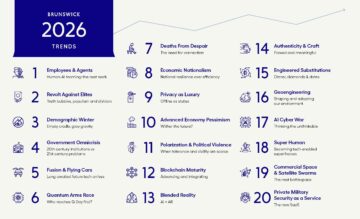Brunswick’s Chelsea Magnant on how to prepare for the next generation of AI innovation.
Most of today’s artificial intelligence models focus on specific tasks and problem domains. But imagine a world where AI can think about a variety of issues and reason like a human. That’s the goal of artificial general intelligence. AGI—when developed—reportedly will have the ability to understand, learn, and apply knowledge across a wide range of domains. The ultimate goal is to create models that are able to perform tasks they’re not necessarily trained for, allowing the technology to unlock discoveries without human direction and the constraints of our imaginations.
AGI is expected to unlock immense possibilities, transforming our businesses and daily lives. Experts anticipate particularly transformative effects in education, finance, healthcare and manufacturing, given AGI’s theoretical ability to improve productivity, accelerate research and development, enhance decision-making across topics, and personalize results for consumers, students and patients. In theory, AGI will eventually outperform humans in ways we can’t even conceptualize yet.
With this technology, however, will also come serious risks. Achieving AGI will require an immense amount of computational power, contributing to increasing energy demands. The rise of AGI will exacerbate ongoing concerns about the future of the workforce, especially unemployment rates and income inequality. Outsourcing decisions to AI models will also exacerbate ethical dilemmas around issues like data privacy and security, bias and accountability.
So how far we are from an AGI-enabled future? Many top researchers agree that AGI is close but disagree on how close, in part because there’s no agreed-upon definition of what AGI is precisely. OpenAI CEO Sam Altman has said he’s excited about AGI’s arrival in 2025, while DeepMind CEO Demis Hassabis has said that AGI is a decade away. Others argue that true AGI is not actually possible given that machines will never be able to replicate the complexity of human emotion and cognition.
Regardless of how you choose to define AGI and when exactly it will arrive, more advanced AI systems are definitely coming. Here are four steps businesses should take now to prepare.
1. Invest in AI Literacy and Talent Development
AI can already help automate routine tasks, allowing employees to focus on more creative and complex problems. As AI evolves, businesses should invest in training to ensure that employees can effectively leverage new developments and work alongside increasingly sophisticated AI systems. Companies should also recruit talent with AI and machine learning expertise to stay ahead of the curve.
2. Focus on Ethical Implementation
To mitigate ethical concerns about AI, companies should establish clear policies for its development and use, focusing on transparency, impartiality and accountability. Companies should also proactively communicate about these policies—internally and externally—to avoid the reputational risks that come with real or perceived ethical concerns, especially as models become more advanced and take on more complex tasks.
3. Adopt Flexible Technologies
Advanced AI will bring about rapid changes in business practices. Companies should prioritize adaptable, scalable technologies that can easily integrate with evolving AI systems. Cloud computing and data analytics platforms can help ease the transition.
4. Maintain Strong Cybersecurity Defenses
Cybercriminals are already leveraging AI, creating more believable phishing emails, malware that can adapt its behavior to evade detection, and deepfakes and other synthetic media that can help spread misinformation or conduct social engineering attacks. At the same time, cyber defenders are using AI to improve their defenses, enabling faster and more effective threat detection and response. It’s important that companies ensure they’re following best practices and staying up to date with security trends, especially as offensive and defensive practices become more sophisticated.
More from this issue

AI Impact
Most read from this issue

AI and the Circular Economy





